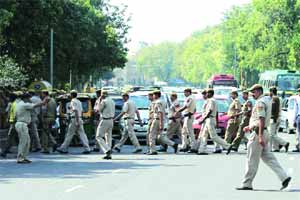In a column that was published in this newspaper on March 22, 2015 (Equity suffers R75,000-crore blow), I had pointed out that central assistance to state plan(s) had been reduced by more than R75,000 crore in the Budget for 2015-16 from the assistance in the revised Budget of 2014-15. If one compared the Budget estimate for 2014-15 and the Budget estimate for 2015-16, the reduction was extremely harsh—nearly R135,000 crore.
After the Fourteenth Finance Commission, it is nobody’s case that no cuts were warranted. The key question was ‘which schemes could be best designed and funded by the state governments and which schemes would still need the lead and financial support of the central government’? That question was not asked and hence the Procrustean cuts.
Impact on police modernisation




The more worrisome question is ‘what will be the qualitative impact of the cuts’? Will not the cut in expenditure impact, adversely, some vital aspects of the scheme? The answer is self-evident: it will affect critical inputs or coverage or spread or duration of the scheme and, in an extreme case, prompt its burial. As more people become aware of the baneful consequences of such reduction, more voices are being raised, both within and outside the government.
One of the centrally-sponsored schemes that the Budget has delinked from central support is the National Scheme for Modernisation of Police and Other Forces. In 2014-15 (RE), R1,433 crore was provided as assistance; this year it is nil and, hereafter, the states have to find the money. The ostensible reason for the change of policy is that ‘law and order’ is a state subject.
It is common knowledge that there are critical gaps in the state police structure—number of policemen and women, vehicles, weapons, communication equipment, forensic laboratories, training centres, anti-terrorist, counter insurgency and other special forces, canine squads, crime records, etc. Besides, there is an inter-state aspect to policing. Criminals, especially terrorists, do not respect state borders. Police infrastructure along state borders and along the coast is a critical need. It is funding that gave the central government oversight on these matters and the vital responsibility of coordination.
The idea of CCTNS
Another problem in policing was that the police of one state barely ‘talked’ among themselves or to the police of another state. Each police station was an island, and records were maintained manually at the police station. The National Crime Records Bureau, followed by the setting up of State Crime Records Bureaus, was the first step towards storage, sharing and accessing data—but it remained technologically primitive and cumbersome. What was required was a seamless, technology-driven network where any police station could ‘talk’ to another police station on a real time basis. Hence, the idea of the Crime and Criminal Tracking Network and System (CCTNS) was conceived. It is a system to facilitate collection, storage, retrieval, analysis, transfer and sharing of data and information at the police station, between a police station and another police station or district HQ or state HQ, and between the police of one state and another state or the central government, including the IB, CBI and Central Police Organisations. The system had to overcome problems of hardware, software, security, privilege and, above all, language.
After months of negotiations, training of personnel, handholding, and promise of generous financial assistance, all states were brought on board. The ambitious scheme is being implemented, albeit with some delay. Successful completion will depend upon adequate and timely provision of funds, close monitoring and coordination. The idea is to build a national system, not a collection of 29 state systems. Besides, the system must be upgraded periodically with infusion of new technology, equipment and software. These can be done only if there is an oversight mechanism to ensure that all states—and I mean all states—move at the same speed and agree on every aspect of the system.
It is at this crucial juncture that the government has decided to cut off funds to CCTNS. I suspect the decision was one of those routine bureaucratic actions and not much thought went into making the decision at the higher levels of government.
Sound the bugle
What I have said about CCTNS will apply to some other schemes which have been completely delinked from central funds. The Special Infrastructure Scheme (SIS) for naxalite-affected areas is an example. I wish Ms Sudha Pillai (former secretary, Planning Commission) or some of the district collectors who implemented SIS during their tenures will speak or write about the transformation brought about by SIS in areas that had been grossly neglected for decades by the state governments concerned.
Thankfully, the ministry of home affairs is not taking the decision to deny funds to Modernisation of Police Forces, CCTNS and SIS without protest. Media reports say that Mr LC Goyal, home secretary, has written “multiple letters” to the ministry of finance. I presume the letters were written with the approval of Mr Rajnath Singh, home minister.
The home minster has sounded the first bugle. It is time for the ministers of health, human resource development, social justice and empowerment, and women and child development to protest the denial or drastic reduction of funds to critical national schemes under their charge.
For Updates Check Editorials and Columns; follow us on Facebook and Twitter




















